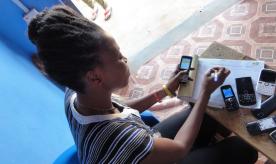Cash and compliance with social distancing: Experimental evidence from Ghana
Due to high population density, difficulty in enforcing compliance with social distancing and self-isolation, and economic vulnerability, the COVID-19 pandemic may be especially devastating for households in African countries.
This project aims to understand the role that cash transfers can play as a policy tool both to increase household resilience during the pandemic and to stem the spread of the disease by increasing adherence to social distancing and government-imposed lockdowns.
An important question is whether poor households will adhere to social distancing given the likely inability to work remotely, and the subsequent large income losses. In such a context, cash transfers may not only help households maintain consumption levels but also complement social distancing policies as those that get the cash may work less and stay at home more.
We propose a two-arm mobile money transfer study in Ghana to test this idea. Our study will be an "add-on" to the ongoing Ghana Panel Study. For our sample we will select 1,500 heads of poor households.
The study was launched in April 2020 and the cash transfers were complemented by four rounds of bi-weekly phone surveys (with a 1-2 week gap between rounds to analyse data and adjust instruments). Data collection of this first phase completed in early December 2020. The second phase will comprise of two more phone surveys (February and April 2021) to measure the longer-term impacts on the cash transfers.





